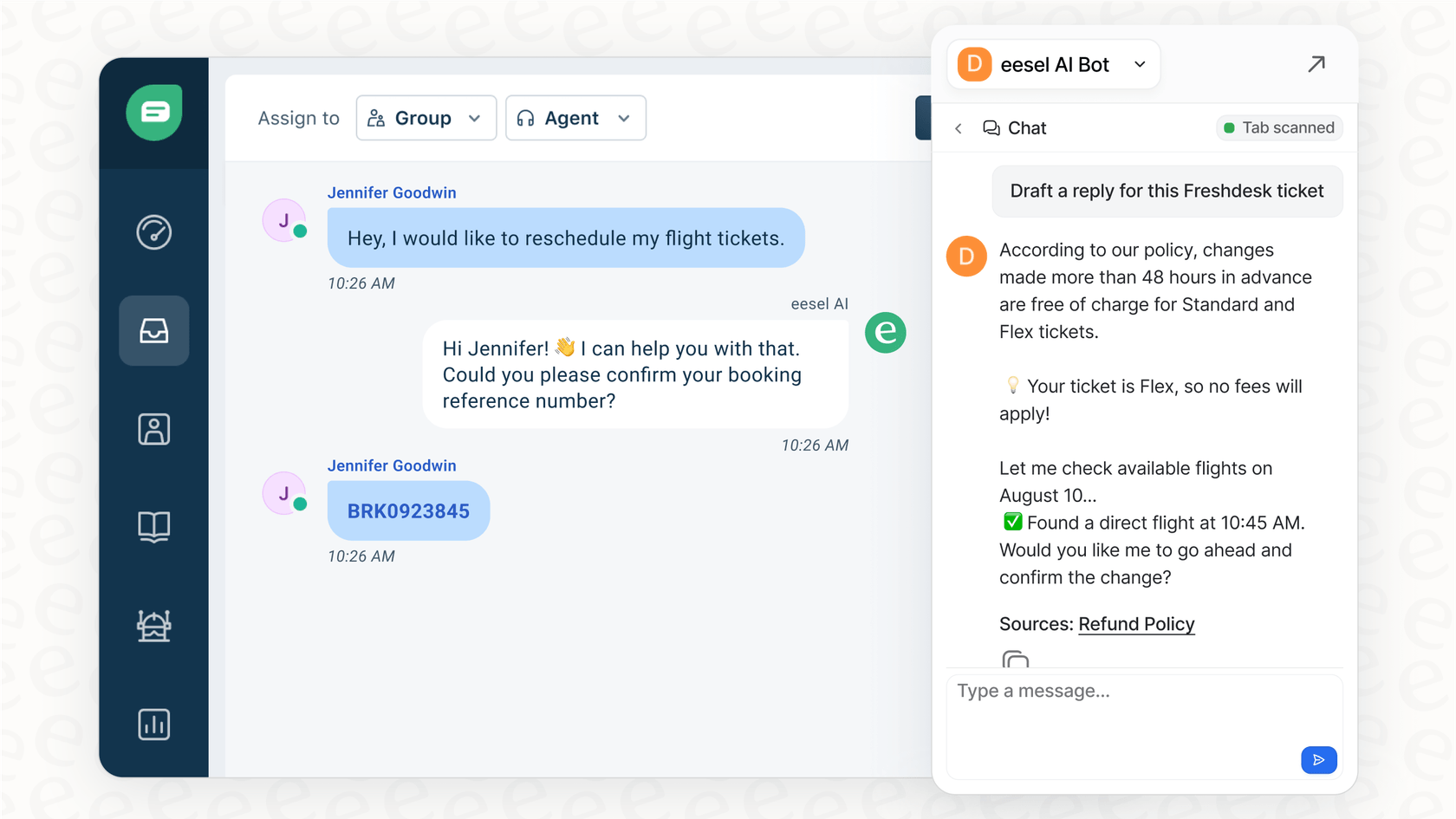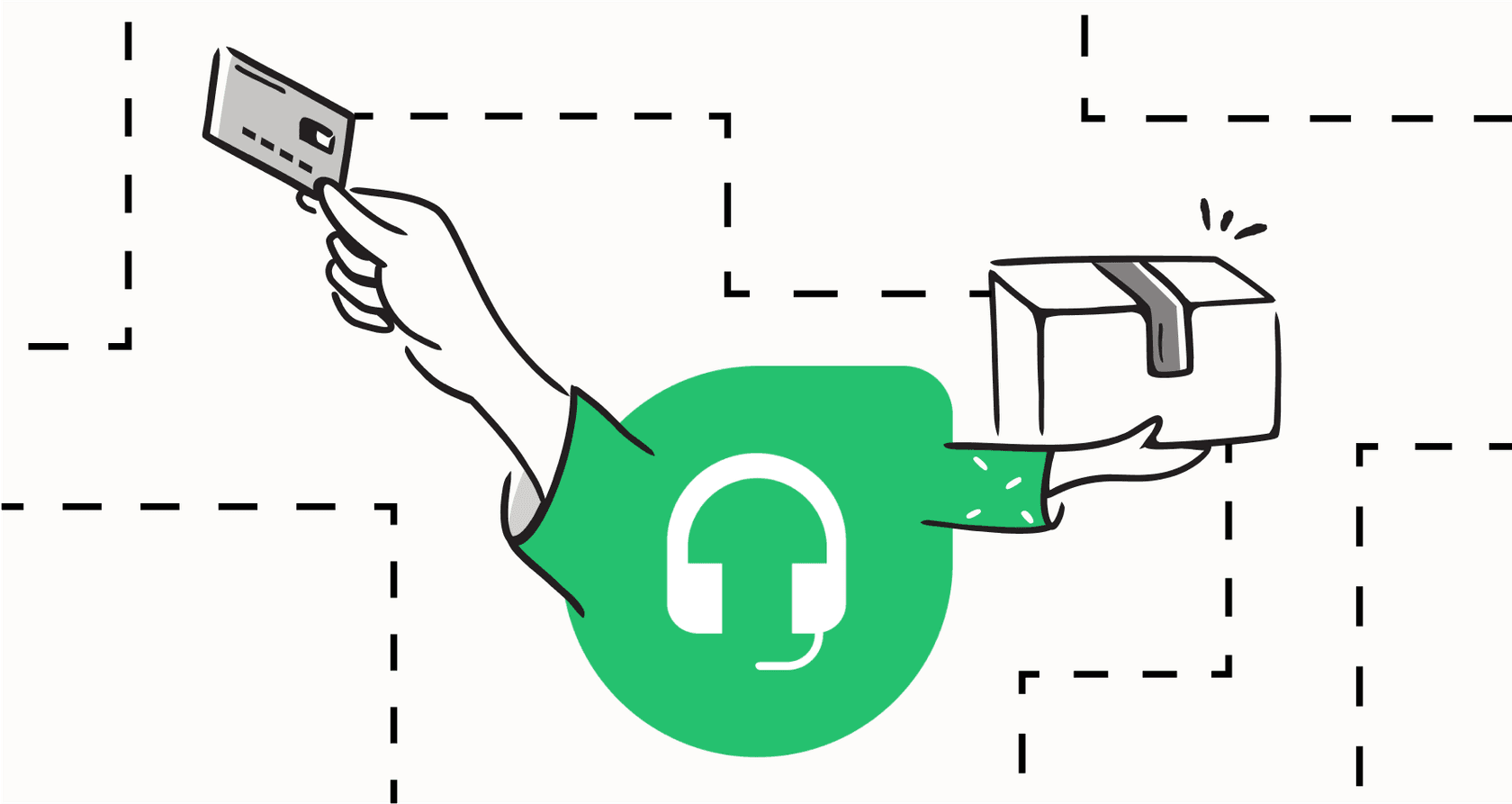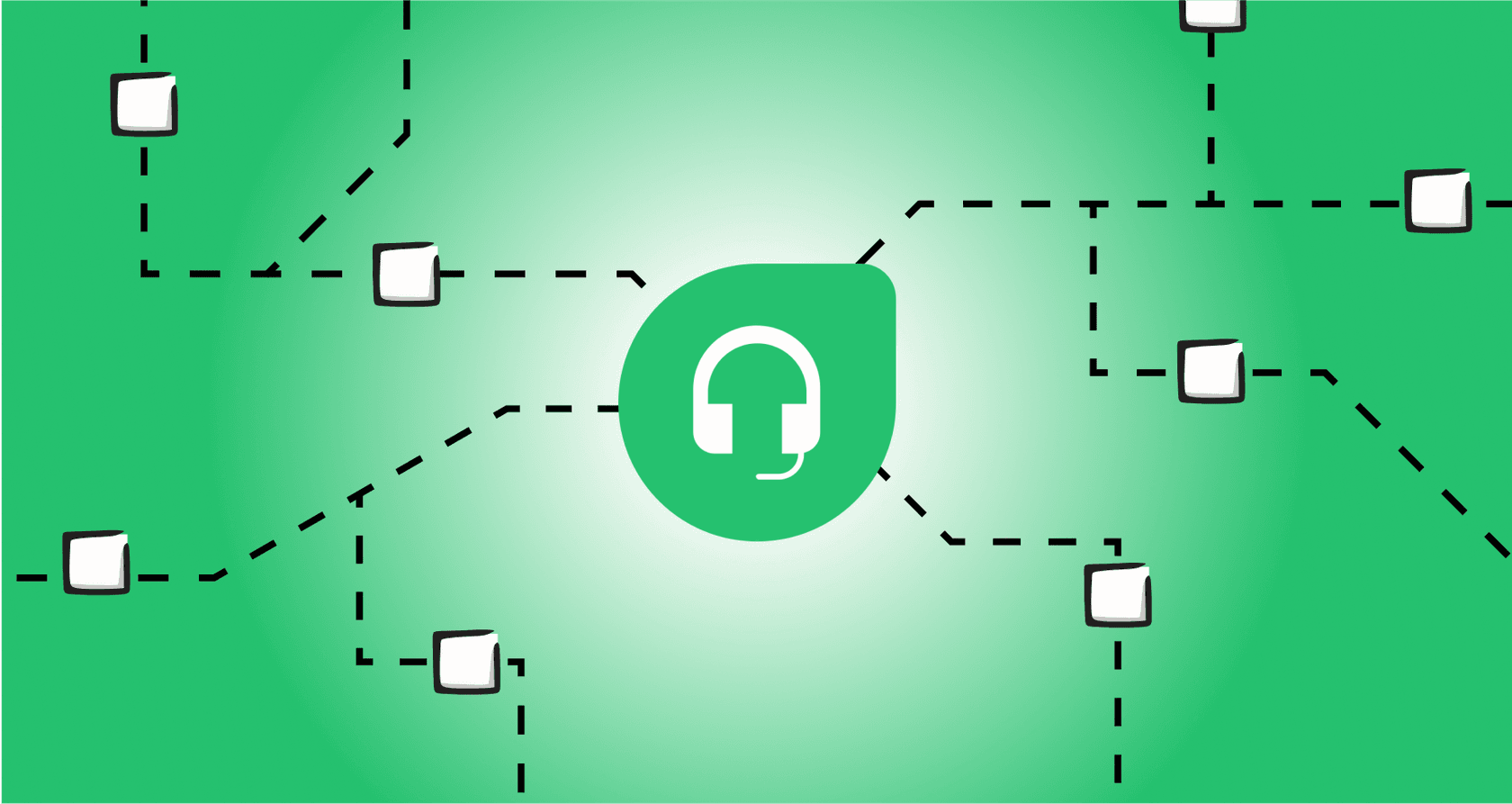How Freshdesk AI recommends solution articles during reply: What you need to know

Kenneth Pangan

Stanley Nicholas
Last edited January 16, 2026
Expert Verified

If you're in customer support, you know the drill: resolve tickets faster, but don't let the quality drop for a second. It's a constant balancing act. AI has been a game-changer in this space, promising to give agents the right information at the right time.
Freshdesk, as a mature and reliable platform, offers a range of AI features designed to empower support teams. These tools are built to help agents find the right information efficiently, making the support process smoother for everyone involved.
This guide will walk you through exactly how the Freshdesk AI to recommend solution articles during reply feature works. We’ll look at the strengths of this system, the benefits it brings to your team, and how you can further enhance your setup by adding a complementary AI layer to the Freshdesk ecosystem you already trust.
What is Freshdesk's AI article suggestion feature?
Freshworks' built-in AI is named Freddy AI. It's an impressive collection of tools meant to help with both customer self-service and agent productivity. When we're talking about suggesting articles, we're looking at a piece of the Freddy AI Copilot, which includes features like the "Solution Article Suggester" and "Reply Suggester."
Think of these tools as an agent's helpful assistant, designed to surface relevant knowledge base content so the agent can stay focused on the customer without needing to manually search for documentation.
How it works: From ticket to suggestion
The process itself is intuitive. When a new ticket lands in your inbox or support portal, Freddy AI gets to work.
It scans the ticket’s subject line and description, picking out keywords to understand what the customer is asking about. Based on that analysis, it digs through your Freshdesk knowledge base to find solution articles that are a match. This ensures that the suggestions provided are always aligned with your company's official, published documentation.
For the agent, these suggestions appear right in the ticket view. They might see a "Freddy Suggests" box in the sidebar or even some helpful "ghost text" right in the reply editor. Agents can also use a keyboard shortcut to pull up the suggestions. From there, they can easily insert the full article text or a link into their response with a single click.

The main benefits of Freshdesk's AI article suggestions
For teams that have invested in building a robust knowledge base, this feature is incredibly helpful. It is a solid step toward using AI to streamline your support team's workflow and improve efficiency.
Get new agents up to speed faster
Training new hires is a significant investment. When AI can point them toward company-approved answers for common questions, they can start handling tickets with a lot more confidence. This helps new team members feel supported and allows them to contribute quickly.
Keep replies consistent
When every agent uses the same set of solution articles, your customers get a reliable and consistent experience. The information provided is accurate and stays true to your brand's voice, regardless of which agent is handling the ticket. This is a great way to maintain high service quality.
Spend less time searching
For simple, repetitive questions, this feature can save agents valuable time. Instead of needing to search the knowledge base in a separate tab, the most likely answer is presented directly to them. For teams dealing with a high volume of tickets, these saved minutes add up to a significant boost in overall productivity.
Considerations for Freshdesk's AI article suggestions
While the native tool is a strong starting point, some teams may find they want to expand their AI capabilities as their support needs grow more complex. Freshdesk provides a fantastic foundation that can be further enhanced with specialized tools.
Consideration 1: Knowledge base focus
Freddy AI is designed to work seamlessly with your Freshdesk knowledge base. This ensures that the AI stays within the boundaries of your verified documentation. However, if your team stores a lot of knowledge in other places - like internal process docs on Confluence or Google Docs - you might find it helpful to use a tool that can bridge those gaps.
This is where a complementary option like eesel AI can add value. eesel connects to your company's diverse knowledge sources. It integrates with Freshdesk to learn from past tickets while also plugging into Confluence, Google Docs, Slack, and over 100 other tools to provide a broader context when needed.
Consideration 2: Focus on initial replies
According to Freshdesk's help documentation, the Reply Suggester is optimized to work on the first message in a ticket. This is excellent for ensuring that every ticket gets a fast, accurate start.
For more complex, long-running conversations with multiple follow-ups, some teams look for additional tools. eesel's AI Copilot, for example, is designed to read the entire conversation history, providing context-aware draft replies at any point in the ticket thread.

Consideration 3: Performance planning
Freshdesk's AI is built for ease of use, allowing you to activate it and see immediate benefits. It is a straightforward implementation that works well for many teams.
For teams that prefer to test and simulate AI performance on historical data before going live, adding a specialized layer can be useful. eesel AI includes a simulation mode that allows you to run the AI on thousands of past tickets, giving you a forecast of its impact and helping you refine your knowledge base before the AI interacts with customers.
Consideration 4: The role of the AI assistant
Freddy AI serves as a powerful assistant, suggesting content for agents to review and send. This keeps the agent in control of the final output.
If you are looking for even deeper automation, an AI Agent from eesel AI can be configured to take specific actions. For example, you can create workflows where the AI answers a question and also automatically tags a ticket or checks a status in an external tool like Shopify. This is a great way to build on the foundation Freshdesk provides.
Pricing for Freshdesk's AI features in 2026
Freshdesk offers tiered plans to match different team sizes and needs. To access the Freddy AI Copilot and its article suggestion features, you will typically look at the following options:
-
Freshdesk Support Pro Plan: Designed for scaling teams, starting around $49 per agent/month (billed annually).
-
Freshdesk Support Enterprise Plan: For large-scale operations requiring advanced features, starting around $79 per agent/month (billed annually).
-
Freddy AI Add-on: Freshdesk provides these AI features as a specialized add-on, often priced around $29 per agent/month, allowing you to add power to your existing plan as you grow.
This per-agent pricing provides clear and predictable costs, making it easier for businesses to budget for their support needs. If you are looking for a usage-based alternative to complement your setup, eesel AI's pricing is based on AI usage rather than seats, offering flexibility for different team structures.
A smarter way: Enhance Freshdesk with eesel AI
You don't need to change your help desk to get more from AI. You can maintain the Freshdesk workflow your team loves and simply plug in eesel AI as a complementary "brain." eesel AI works within the Freshdesk ecosystem to unlock advanced automation.
Get started in minutes You can connect eesel AI to your Freshdesk account with a single click. It's a self-serve platform that allows you to set up simulation modes quickly, ensuring you are ready to go without a complex implementation process.
Train on your team's real expertise By training the AI on your past ticket resolutions, eesel learns your brand's unique voice and the solutions that have historically worked best for your customers. It acts as an extension of your most experienced agents.
Customizable workflows With eesel’s automation rules, you stay in control. You can decide exactly which tickets the AI should handle and which should be escalated, allowing you to roll out automation at a pace that feels right for your team.
Here’s a quick look at how these tools work together:
| Feature | Freshdesk Native AI (Freddy) | eesel AI Integration for Freshdesk |
|---|---|---|
| Knowledge Sources | Freshdesk knowledge base | Past tickets, KB, Confluence, Google Docs, Slack, and more |
| Automation Scope | Suggests articles for agents | Drafts full replies, triages tickets, and takes custom actions |
| Testing & Simulation | Direct implementation | Simulation on historical tickets before going live |
| Customization | Built-in feature toggles | Granular control over AI persona and automation rules |
| Setup | Seamless admin configuration | 1-click integration, fully self-serve |
From simple suggestions to smart automation
Freshdesk's built-in AI for suggesting solution articles is a reliable and mature feature. It is a fantastic starting point for teams with organized knowledge bases who want to give their agents a productivity boost.
By understanding how these suggestions work and where they focus, you can make informed decisions about your support strategy. For teams that want to expand their capabilities even further, adding a dedicated AI platform like eesel AI to your Freshdesk setup is a logical and powerful next step.
Ready to see how AI can complement your Freshdesk experience in 2026? Try eesel AI with your Freshdesk account for free or book a demo to see it in action.
Frequently asked questions
This feature, powered by Freddy AI, scans incoming tickets and suggests relevant articles from your Freshdesk knowledge base directly within the agent's view. It helps agents quickly find and insert helpful solutions into their replies.
The main advantages include faster onboarding for new agents, ensuring consistent replies across your team, and reducing the time agents spend searching for answers to common questions. It is a great way to streamline responses for repetitive inquiries.
One key consideration is that the tool focuses on your official Freshdesk knowledge base to ensure information is brand-approved. Additionally, it is specifically optimized to assist with initial replies to help get conversations started quickly.
It works by analyzing the subject line and description of a new ticket, identifying keywords, and then searching your published Freshdesk knowledge base for matching solution articles. This ensures that the suggestions provided are always based on your verified documentation.
This feature is a part of the Freddy AI Copilot, which is available on Freshdesk's higher-tier plans (like Pro or Enterprise) or as a specialized add-on, ensuring that growing teams have access to powerful productivity tools.
According to Freshdesk's documentation, this feature is primarily designed to assist with the first message in a ticket. This helps agents set the right tone and provide immediate value from the very first interaction.
It acts as a powerful assistant by suggesting articles, allowing agents to maintain the human touch. Agents review the suggestions and choose the best fit, ensuring that every response is accurate and personalized.
Share this post

Article by
Kenneth Pangan
Writer and marketer for over ten years, Kenneth Pangan splits his time between history, politics, and art with plenty of interruptions from his dogs demanding attention.





